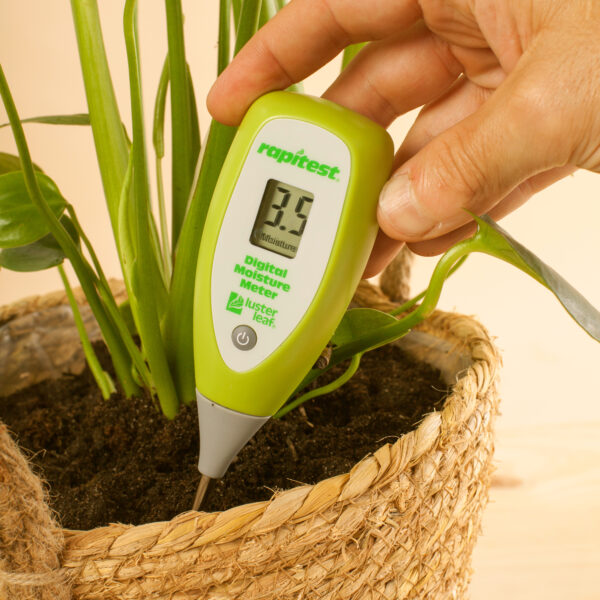The Ultimate Guide to Picking the Right Moisture Meter for Your Demands
Wiki Article
The Ultimate Guide to Moisture Meters: A Comprehensive Overview and Just How They Can Save You Cash
Wetness meters offer as essential tools in spotting and keeping an eye on moisture content in products, helping in protecting against expensive damages and making sure the top quality of products. Comprehending the nuances of different types of wetness meters, their applications, and the prospective cost-saving advantages they use can be a game-changer for professionals and services alike.Sorts Of Wetness Meters
One usual kind is the pin-type dampness meter, which gauges the electrical resistance in between two pins put into a product. Pinless wetness meters, on the other hand, usage electromagnetic sensing unit plates to scan a bigger location without causing damages to the product's surface.
Infrared dampness meters gauge the thermal residential or commercial properties of a product to determine its moisture web content non-invasively, making them helpful for applications where pin or pinless meters might not be ideal. Recognizing the different types of dampness meters available can help markets choose the most ideal device for their certain wetness dimension demands.

Benefits of Using Dampness Meters
Wetness meters provide indispensable benefits in properly keeping track of and examining wetness levels in varied materials and settings (Moisture Meter). One of the main advantages of making use of dampness meters is the avoidance of prospective damage caused by excess moisture. By spotting and addressing high moisture levels beforehand, dampness meters help to avoid mold and mildew growth, rot, and architectural damage in structures, saving both money and time on repair services. In addition, moisture meters aid in making certain the high quality of products during building and construction or production procedures. By precisely gauging moisture material, these devices help keep the integrity of timber, drywall, concrete, and various other products, decreasing the risk of problems or failures.
In addition, making use of wetness meters can lead to raised power performance. In agricultural setups, wetness meters play an essential role in enhancing plant returns by allowing farmers to monitor soil moisture levels and make notified irrigation choices.
Just How to Choose the Right Wetness Meter
Picking the appropriate dampness meter includes thinking about vital elements such as product compatibility, dimension array, and calibration accuracy. When selecting a wetness meter, it's vital to make certain that the meter is ideal for the particular product you will certainly be screening. Different materials have differing electric residential properties that can affect moisture readings, so picking a meter made for your product is crucial for accurate outcomes. Furthermore, take into consideration the measurement series of the dampness meter. Make sure that the meter can detect wetness levels within the range needed for your applications. Calibration precision is another vital aspect to maintain in mind. Choose a moisture meter with reputable calibration to make sure exact and regular readings. Some meters might call for periodic calibration modifications, so recognizing the calibration procedure is very important. By carefully assessing these factors, you can choose a dampness meter that meets your needs and offers exact wetness dimensions for your projects.Correct Techniques for Dampness Meter Use

Cost Financial Savings Through Dampness Meter Applications
Just how can the calculated use of moisture meters bring about substantial expense savings throughout numerous markets? Wetness meters play a critical function in cost savings by preventing potential damage and guaranteeing quality assurance in different fields. In the farming market, moisture meters help in visit the site identifying the ideal time for harvesting crops, preventing over-drying or excess wetness that can impact the end product's top quality. This accurate tracking aids farmers stay clear of unneeded losses and maximize check it out their return.
Similarly, in building, wetness meters aid protect against expensive problems by identifying moisture levels in structure products, such as timber or concrete, which can cause structural problems if not resolved without delay. By determining issue areas early on, contractors can take restorative actions to stay clear of comprehensive repair work or substitutes, eventually conserving money and time.
In addition, in the food processing sector, moisture meters are important for keeping track of product quality and making certain compliance with safety and security policies. By accurately gauging wetness material in food items, manufacturers can prevent spoilage, preserve quality, and decrease waste, leading to considerable expense savings. In general, the calculated application of moisture meters is a valuable financial investment that can result in substantial cost decreases and enhanced effectiveness throughout different industries.
Final Thought
Finally, wetness meters are important tools for identifying and measuring moisture levels in numerous materials. By using the right wetness meter and adhering to proper strategies, individuals can properly prevent costly you could try these out damages brought on by excess dampness. Buying a top quality dampness meter can lead to significant cost financial savings over time by identifying prospective concerns at an early stage and enabling prompt remediation. Eventually, wetness meters are necessary instruments for maintaining the stability and durability of products and structures.Dampness meters serve as crucial devices in identifying and checking moisture material in products, aiding in protecting against expensive damages and making sure the top quality of products. Infrared dampness meters measure the thermal residential or commercial properties of a material to establish its wetness web content non-invasively, making them helpful for applications where pin or pinless meters may not be suitable.Dampness meters offer vital advantages in properly assessing and monitoring wetness levels in varied materials and atmospheres. In agricultural settings, wetness meters play an important role in optimizing crop yields by enabling farmers to monitor dirt wetness degrees and make informed irrigation choices.In verdict, dampness meters are beneficial devices for identifying and measuring moisture levels in different materials.
Report this wiki page